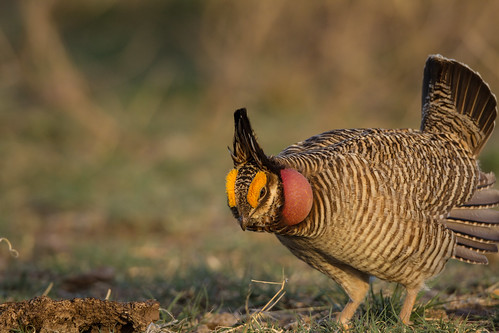 |
| Lesser Prairie-Chicken |
I get through most of my days like pretty much everybody, thinking about and doing what needs to be done, accomplishing what I can in dribs and drabs, procrastinating now and then, having sudden bursts of creativity and energy, having some fun and dealing with some frustrations, and hardly thinking about the big questions of life. But perhaps because I started out the year with a heart attack, I’ve been having more days when I appreciate how happy I am to be alive right now, in this lovely place on this lovely planet; how grateful I am for my family and friends and my little dog Pip; and how profoundly lucky I am.
I'm the third person in my family to have had a heart attack, but only the first to survive one. That’s profoundly unfair. For that matter, all my good fortune is not fair, nor are the bad things that happen to me.
Fairness is a human construct, while the nature of life on this planet is far too random for fairness to have any meaning. It's up to us humans, who so cherish the ideal of fairness, to make life fairer for those humans and creatures less fortunate than we, in the way that Pope Francis is asking every European parish to take in a refugee family right now.
It's sad that so many Americans consider justice to be limited to punishing wrongdoers, while casting a blind eye to the bigger parts of the equation: rewarding the finest among us and helping those in need. As human beings, our first priority is obviously other humans, but the creatures with whom we share this planet are also our responsibility.
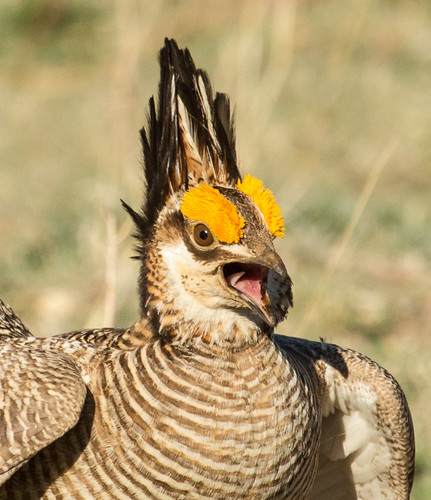 |
When the idea of protecting endangered species was new, before corporations had bought up judges and congressmen and geared up to fight every legal protection tooth and nail, Attwater's Prairie-Chicken was listed as Endangered. This wondrous bird had once numbered in the millions in the coastal plains of Texas and Louisiana, but by 1919, every single one had disappeared from Louisiana, and by 1967, when it was listed, only 1,070 remained in Texas. Even with the new protections, including a vigorous captive breeding program and painstaking efforts to protect young chicks in the wild, the numbers kept dropping. By 2002, the population had plummeted to 40. This year’s total was 104--a number I've heard touted by conservatives as a huge success, as if they somehow get credit for this "greater than 150 percent increase." As with all grassland species, natural disasters can decimate populations. Storms as violent as that King Lear faced on the heath cause huge swings in prairie chicken numbers from year to year, so the US Fish and Wildlife Service won't downgrade the Attwater's Prairie-Chicken status from Endangered until a minimum of 6,000 have been breeding for at least 10 years. (Link to New York Times story from last week.)
King Lear on the heath, his poor old body being pelted by the storm after his heart had been pierced by the unfairness of two of his daughters' cruelty to him and his own cruelty to his third daughter, didn't whine about unfairness—he raged at it even as he took off his own cloak to comfort and warm someone in worse straits than he, Tom o' Bedlam. The unfairness he faced made him recognize the ways he should have imposed fairness himself when he had the riches and power to do so.
Poor naked wretches, whereso'er you are,In the final analysis, this may be the one way that we humans are different from animals. We have both the capacity to "shake the superflux" to those less fortunate than we and the concept of fairness that demands we do so. In a random universe, we who have the concept of fairness embedded in our very souls have the obligation to bestow mercy and kindness on those who deserve it—an obligation that is every bit as sacred and every bit as just as meting out punishment to wrongdoers.
That bide the pelting of this pitiless storm,
How shall your houseless heads and unfed sides,
Your looped and windowed raggedness, defend you
From seasons such as these? Oh, I have ta'en
Too little care of this! Take physic, pomp.
Expose thyself to feel what wretches feel,
That thou mayst shake the superflux to them
And show the heavens more just.
I guess the thought that stays with me after my heart attack is that to have a happy life, we need to recognize and savor what we have, whether we deserve more or less; to share our riches with others; and to protect those who need it in order to "show the heavens more just," exactly as Pope Francis asked European Catholics to do.
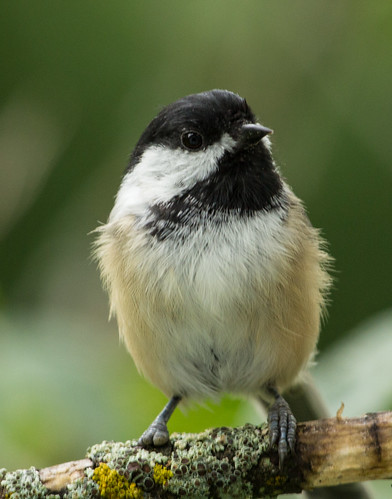 |
| My chickadee missing three toes--he raised at least 5 babies this year! |
And since my heart attack, I’ve had way more to savor than I’ve deserved. My neighborhood bustled with bird nesting activities all summer, including Ruby-crowned Kinglets, robins, and my favorite chickadee raising his chicks successfully. Now, since August, migration has been rich and beautiful to see and hear. I have a new birdbath with a tiny recirculating waterfall; it attracted several kinds of warblers and other little birds. I have a wonderful friend who gave me brand new binoculars through which to enjoy the spectacle. And I have new hearing aids that are allowing me to hear them with the vibrance I savored when I was in my 20s. I still can’t wrap my head around these riches.
 |
| Pip helps me open my new binoculars! |
 |
 |
| That catbird in the dogwood |
 |
| Pip looking for that catbird. |
When I'm inside at night, Pip snuggled against me, I can savor photos I've taken, wonderful past events making my present even brighter. In 2014, I spent several hours at a Lesser Prairie-Chicken lek, in a photography blind, just a few feet from these glorious birds. The photographer with me had rented an 800-millimeter lens, so huge it looked like a bazooka, which he set up on a heavy-duty tripod. Whenever he used another lens, he let me hook up my own camera to the amazingly wonderful lens!
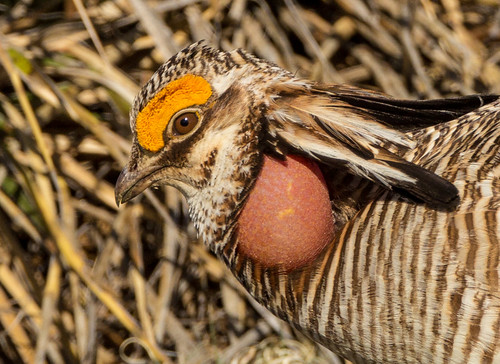 |
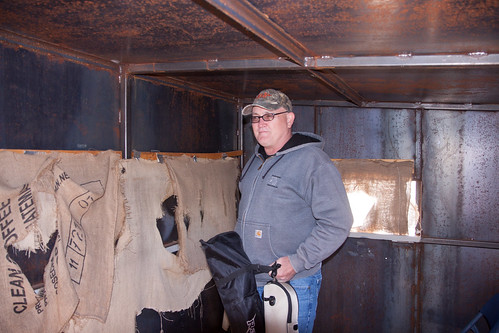 |
“The best is yet to come” is an empty promise when someone is dealing with a debilitating condition, has come to the realization that no kind of future is guaranteed to anyone, or who is focused on declining species. But to keep fighting to ensure that people and birds in trouble can pull through, we need to keep our own spirits up. Edward Abbey closed Desert Solitaire with this:
One final paragraph of advice: do not burn yourselves out. Be as I am - a reluctant enthusiast....a part-time crusader, a half-hearted fanatic. Save the other half of yourselves and your lives for pleasure and adventure. It is not enough to fight for the land; it is even more important to enjoy it. While you can. While it’s still here. So get out there and hunt and fish and mess around with your friends, ramble out yonder and explore the forests, climb the mountains, bag the peaks, run the rivers, breathe deep of that yet sweet and lucid air, sit quietly for a while and contemplate the precious stillness, the lovely, mysterious, and awesome space. Enjoy yourselves, keep your brain in your head and your head firmly attached to the body, the body active and alive, and I promise you this much; I promise you this one sweet victory over our enemies, over those desk-bound men and women with their hearts in a safe deposit box, and their eyes hypnotized by desk calculators. I promise you this; You will outlive the bastards.Of course, Abbey's promise is as empty as "the best is yet to come"—he's dead and the forces demolishing our natural world are stronger than ever. But as Abraham Lincoln put it, "It is for us the living, rather, to be dedicated here to the unfinished work which they who fought here have thus far so nobly advanced." With what time we each are given, to the best of our abilities, we should honor the better angels of our nature by saving and savoring that which we love.
I’m planning to go on one of Kim Eckert’s birding trips to California in January, and am saving up for a trip to see my most wanted bird on the planet, the Cuban Tody, so in my case the best may still be yet to come. It is lovely to have things to look forward to, but even lovelier being able to savor the here and now even as I focus on ways to protect it. And as long as birds are on the planet, and as long as I can still see or hear them with my lovable little dog beside me, I have more than my share of loveliness to savor.
 |